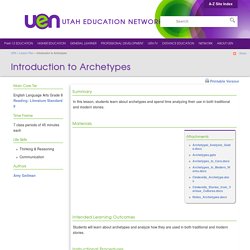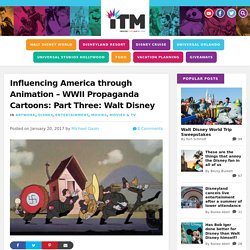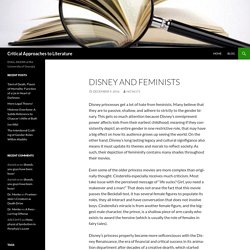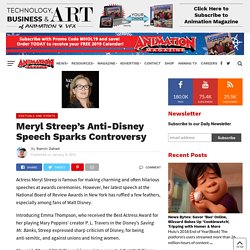

5 Fictional Tropes We'll Never Get Tired Of. Clichés get a bad rap these days, but is it really deserved?

After all, in a complicated world, where good doesn’t always triumph over evil, isn’t it nice to read a story in which boy wins girl, girl wins Hunger Games, and villain is hurled satisfyingly over a cliff while howling about revenge? I like to think of stories that feature these and other familiar tropes as fictional comfort food—a cozy break from a reality filled with tough setbacks, dizzying disappointments, and Real Housewives.
Without further ado, here are a few of our favorite fictional clichés. Boy Who Pretends He Doesn’t Love Girl (But He Really Does) I’m a huge sucker for a story with a good Romantic Hero Who Initially Seems Like He Doesn’t Care About You One Bit, But in Fact He Loves You So Much God You Don’t Even Know. What beloved tropes are we forgetting? Introduction to Archetypes. Time Frame 7 class periods of 45 minutes each Life Skills Thinking & Reasoning Communication Summary In this lesson, students learn about archetypes and spend time analyzing their use in both traditional and modern stories.

Materials Intended Learning Outcomes Students will learn about archetypes and analyze how they are used in both traditional and modern stories. Instructional Procedures Show PowerPoint about archetypes and introduce the concept. Assessment Plan. Archetypesforliteraryanalysis. Deconstructing Disney. Walt Disneys War on the Perception of Propaganda. Influencing America through Animation – WWII Propaganda Cartoons: Part Three: Walt Disney. From political commentary to mustering morale, the animation industry grew during the Second World War.

During a time when almost every industry was tasked with supporting the war effort to stop the Axis powers from dominating the planet, cartoons went from entertaining the young to educating adults. In this three part series, ITM takes a look back at some of these works of art and the artists who created them during this Golden Age of Animation.
In this final chapter: Walt Disney’s contributions to the war effort. Not all of the Disney related propaganda produced for the “war to end all wars” was authorized by the Walt Disney Company. In 1934, Japanese artists used Mickey Mouse to show the evils of American imperialism. Walt Disney and his animators provided numerous training films for both the United States and Canadian military. One such example is the chilling anti-German animation in the 1943 “Education for Death – The Making of a Nazi.” Critical Approaches to Literature. Disney princesses get a lot of hate from feminists.

Many believe that they are to passive, shallow, and adhere to strictly to the gender binary. This gets so much attention because Disney’s omnipresent power affects kids from their earliest childhood, meaning if they consistently depict an entire gender in one restrictive role, that may have a big effect on how its audience grows up seeing the world. On the other hand, Disney’s long lasting legacy and cultural signifigance also means it must update its themes and morals to reflect society. As such, their depiction of femininity contains many shades throughout their movies. Even some of the older princess movies are more complex than originally thought. Disney’s princess property became more selfconciouss with the Disney Renaissance, the era of financial and critical success in its animation department after decades of a creative dearth, which started with the Little Mermaid and reached its peak with The Lion King.
Meryl Streep's Anti-Disney Speech Sparks Controversy. Actress Meryl Streep is famous for making charming and often hilarious speeches at awards ceremonies.

However, her latest speech at the National Board of Review Awards in New York has ruffled a few feathers, especially among fans of Walt Disney. Introducing Emma Thompson, who received the Best Actress Award for her playing Mary Poppins’ creator P. L. Travers in the Disney’s Saving Mr. Banks, Streep expressed sharp criticism of Disney, for being anti-semitic, and against unions and hiring women. She said, “One of [Walt Disney’s] associates reported that Walt Disney didn’t really like women. Streep continued, “Disney, who brought joy, arguably, to billions of people, was perhaps … or had some racist proclivities.
“Dear Miss Ford, your letter of recent date has been received in the inking and painting department for reply. “When I saw the film, I could just imagine Walt Disney’s chagrin at having to cultivate P.L. “Then there was Joe Grant, Dave Detiege, Lou Appet and Ed Solomon.